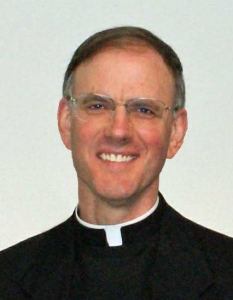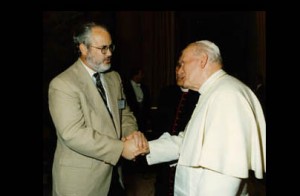Let him who is consoled see to humbling himself and lowering himself as much as he can, thinking how little he is able for in the time of desolation without such grace or consolation. On the contrary, let him who is in desolation think that he can do much with the grace sufficient to resist all his enemies, taking strength in his Creator and Lord.
[powerpress]
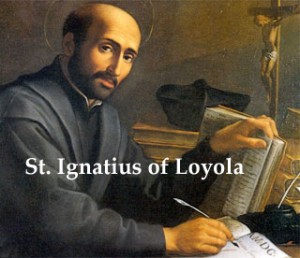 The Discernment of Spirits: Setting the Captives Free – Serves as an introduction to the Spiritual Exercises of St. Ignatius of Loyola
The Discernment of Spirits: Setting the Captives Free – Serves as an introduction to the Spiritual Exercises of St. Ignatius of Loyola
The 14 Rules for Discerning Spirits –
“The Different Movements Which Are Caused In The Soul”
as outlined by St. Ignatius of Loyola can be found here
Father Timothy M. Gallagher, O.M.V., was ordained in 1979 as a member of the Oblates of the Virgin Mary, a religious community dedicated to retreats and spiritual formation according to the Spiritual Exercises of St. Ignatius. Â Fr. Gallagher is featured on the EWTN series “Living the Discerning Life: Â The Spiritual Teachings of St. Ignatius of Loyola”.Â
For more information on how to obtain copies of Fr. Gallaghers’s various books and audio which are available for purchase, please visit  his  website: www.frtimothygallagher.org
 For the other episodes in this series visit
Fr. Timothy Gallagher’s “Discerning Hearts†page
Tags: catholic, catholic podcast, catholic prayer, cathollc spirituality, discernment of spirits, Father Timothy M. Gallagher, Timothy Gallagher
This entry was posted on Thursday, February 24th, 2011 at 7:34 am
You can follow any responses to this entry through the RSS 2.0 feed.
The Seventh Thursday in Ordinary Time – from the Gospel of Mark the full reading and reflection
an excerpt from today’s reflection by Don Schwager: 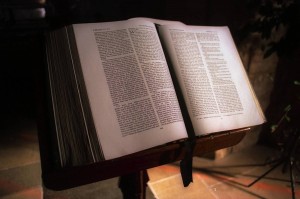
Was Jesus’ exaggerating when he urged his followers to use drastic measures to avoid evil and its harmful consequences? Jesus set before his disciples the one supreme goal in life that is worth any sacrifice, and that goal is God himself and his will for our lives which leads to everlasting peace and happiness. Just as a doctor might remove a limb or some part of the body in order to preserve the life of the whole body, so we must be ready to part with anything that causes us to sin and which leads to spiritual death. Jesus warns his disciples of the terrible responsibility that they must set no stumbling block in the way of another, that is, not give offense or bad example that might lead another to sin. The Greek word for temptation (scandalon) is exactly the same as the English word scandal. The original meaning of scandal is a trap or a stumbling block which causes one to trip and fall. The Jews held that it was an unforgivable sin to teach another to sin. If we teach another to sin, he in turn may teach still another, until a train of sin is set in motion with no foreseeable end. The young in faith are especially vulnerable to the bad example of those who should be passing on the faith. Do you set a good example for others to follow, especially the young?
What does Jesus mean when he says “have salt in yourselves”? Salt served a very useful purpose in hot climates before the invention of electricity and refrigeration. Salt not only gave food flavor, it also preserved meat from spoiling. Salt was used as a symbol of fellowship and the common meal. The n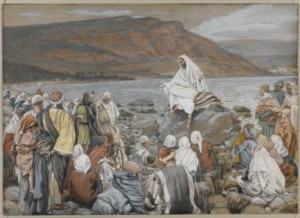 ear-Eastern expression to betray the salt meant to betray one’s Master or some person who was owed loyalty and devotion. Leonardo da Vinci in his painting of the Last Supper depicts Judas in the act of tipping over the salt shaker, thus symbolically indentifying himself as the betrayer of his Master. Jesus used the image of salt to describe how his disciples are to live in the world. As salt purifies, preserves, and penetrates, so the disciple must be as salt in the world of human society to purify, preserve, and penetrate that society for the kingdom of God and of his righteousness and peace. What did Jesus mean by the expression “salted with fire” and “salt becoming saltless”? Salt was often put in ovens to intensify the heat. When the salt was burned off and no longer useful it was thrown out on the road or on the roof top where it would easily get trodden upon. Perhaps Jesus wanted to contrast useful salt used for giving flavor and for preserving food with salt which was burned and no longer of much benefit, to encourage his disciples to be faithful witnesses and to not neglect the opportunity to influence others for the kingdom of God through the witness of their lives and their testimony to the power of the kingdom of God.
ear-Eastern expression to betray the salt meant to betray one’s Master or some person who was owed loyalty and devotion. Leonardo da Vinci in his painting of the Last Supper depicts Judas in the act of tipping over the salt shaker, thus symbolically indentifying himself as the betrayer of his Master. Jesus used the image of salt to describe how his disciples are to live in the world. As salt purifies, preserves, and penetrates, so the disciple must be as salt in the world of human society to purify, preserve, and penetrate that society for the kingdom of God and of his righteousness and peace. What did Jesus mean by the expression “salted with fire” and “salt becoming saltless”? Salt was often put in ovens to intensify the heat. When the salt was burned off and no longer useful it was thrown out on the road or on the roof top where it would easily get trodden upon. Perhaps Jesus wanted to contrast useful salt used for giving flavor and for preserving food with salt which was burned and no longer of much benefit, to encourage his disciples to be faithful witnesses and to not neglect the opportunity to influence others for the kingdom of God through the witness of their lives and their testimony to the power of the kingdom of God.
“Lord Jesus, fill me with your Holy Spirit that I may radiate the joy of the gospel to others. May your light and truth shine through me that others may find new life and freedom from sin and the corruption of evil.”
for the full reflection visit : Daily Reading and Meditation
Tags: catholic, catholic podcast, catholic prayer, cathollc spirituality, don schwager, gospel of mark, Jesus, Lord Jesus, stumbling block
This entry was posted on Thursday, February 24th, 2011 at 6:00 am
You can follow any responses to this entry through the RSS 2.0 feed.
The Seventh Wednesday in Ordinary Time – from the Gospel of Mark the full reading and reflection
“No one who does a mighty work in my name will be able soon after to speak evil of me”
an excerpt from today’s reflection by Don Schwager: 
Do you rejoice in the good that others do? Jesus reprimands his disciples for their jealousy and suspicion. They were upset that someone who was not of their company was performing a spiritual work in the name of Jesus. They even “forbade” the man “because he was not following us”. Jesus’ reply is filled with wisdom: “No one who does a mighty work in my name will be able soon after to speak evil of me.” Are we not like the disciples when we get upset at the good deeds of others who seem to shine more than us? Paul says that “love is not jealous… but rejoices in the right” (1 Corinthians 13:4,6). Envy and jealousy, its counterpart, are sinful because they lead us to sorrow over what should make us rejoice – namely, our neighbor’s good. The reason we may grieve over our another’s good is that somehow we see that good as lessening our own value or excellence. Envy forms when we believe that the other person’s advantage or possession diminishes or brings disgrace on us. Envy is contrary to love. Both the object of love and the object of envy is our neighbor’s good, but by contrary movements, since love rejoices in our neighbor’s good, while envy grieves over it. How can we overcome envy? With the love that God has put into our hearts through the gift of the Holy Spirit (Romans 5:5). The Holy Spirit purifies our love and frees us from our disordered passions, such as envy, jealously, greed, and bitterness. The love that God places in our hearts seeks the highest good of our neighbor. Ask the Lord to transform your heart that you may always rejoice in the good of others, even in those you find disagreeable.
ord Jesus, your love knows no bounds. Free my heart of all jealousy, pride, fear, and possessiveness, that I may always love others and treat them as you have treated me – with loving-kindness, goodness, mercy, thoughfulness, and generous care.”
for the full reflection visit : Daily Reading and Meditation
Tags: catholic, catholic podcast, catholic prayer, cathollc spirituality, don schwager, gospel of mark
This entry was posted on Wednesday, February 23rd, 2011 at 12:11 am
You can follow any responses to this entry through the RSS 2.0 feed.
“Modern and American Dignity: Who We Are As Persons, and What That Means For Our Future” by Dr. Peter 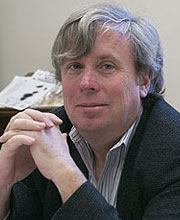 Augustine Lawler is a must have for any who loves to read, think…and ponder. By drawing upon the wisdom from masters like Socrates to Solzhenitsyn, Tocqueville to Chesterton, John Courtney Murray to our “philosopher-pope” Benedict XVI (which I just LOVE), Dr. Lawler uses a charming blend of wit and elegance to fashion a contemporary and relevant understanding of today’s political and moral debates, all the while leaving his “Catholic lenses” firmly in place. He is fantastic. Dr. Lawler guides us through the minefield of contemporary thinking to the heart of the dignity and value of each human person.
Augustine Lawler is a must have for any who loves to read, think…and ponder. By drawing upon the wisdom from masters like Socrates to Solzhenitsyn, Tocqueville to Chesterton, John Courtney Murray to our “philosopher-pope” Benedict XVI (which I just LOVE), Dr. Lawler uses a charming blend of wit and elegance to fashion a contemporary and relevant understanding of today’s political and moral debates, all the while leaving his “Catholic lenses” firmly in place. He is fantastic. Dr. Lawler guides us through the minefield of contemporary thinking to the heart of the dignity and value of each human person.
[powerpress]
Tags: benedict xvi, catholic, catholic podcast, catholic prayer, cathollc spirituality, chesterton, human person, john courtney murray, moral debates, peter augustine lawler, pope benedict xvi, socrates, tocqueville
This entry was posted on Tuesday, February 22nd, 2011 at 9:46 pm
You can follow any responses to this entry through the RSS 2.0 feed.
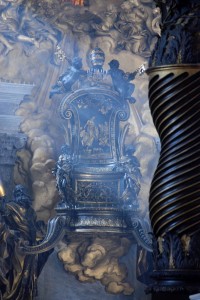 The Feast of the Chair of St. Peter is not so much a feast celebrating a “chair”, but more a feast celebrating what the chair symbolizes…the gift of the Papacy. I remember seeing it for the first time…not only the stunning piece used to preserve it by Bernini…but the whole altar piece setting at St. Peter’s…breathtaking. Almost every time I now see the presider’s chair at my local parish or the chair at our cathedral, I think of this chair, but also of the great unity it gives us with the entire Catholic Church under the leadership of the successor of St. Peter…our Holy Father. God bless the Holy Father, Pope Benedict XVI. Praise be to God for the gift of the Pa
The Feast of the Chair of St. Peter is not so much a feast celebrating a “chair”, but more a feast celebrating what the chair symbolizes…the gift of the Papacy. I remember seeing it for the first time…not only the stunning piece used to preserve it by Bernini…but the whole altar piece setting at St. Peter’s…breathtaking. Almost every time I now see the presider’s chair at my local parish or the chair at our cathedral, I think of this chair, but also of the great unity it gives us with the entire Catholic Church under the leadership of the successor of St. Peter…our Holy Father. God bless the Holy Father, Pope Benedict XVI. Praise be to God for the gift of the Pa pacy!
pacy!
Take a listen to Dr. Matthew Bunson talk to us about the importance of this feast in the podcast above.
Also here is the text from the Holy Father’s reflections on this feast from 2006Â from Vatican.va
“On this rock I will build my Church’
Dear Brothers and Sisters,
Today, the Latin-rite liturgy celebrates the Feast of the Chair of St Peter. This is a very ancient tradition, proven to have existed in Rome since the fourth century. On it we give thanks to God for the mission he entrusted to the Apostle Peter and his Successors.
“Cathedra” literally means the established seat of the Bishop, placed in the mother church of a diocese which for this reason is known as a “cathedral”; it is the symbol of the Bishop’s authority and in particular, of his “magisterium”, that is, the evangelical teaching which, as a successor of the Apostles, he is called to safeguard and to transmit to the Christian Community.
When a Bishop takes possession of the particular Church that has been entrusted to him, wearing his mitre and holding the pastoral staff, he sits on the cathedra. From this seat, as teacher and pastor, he will guide the journey of the faithful in faith, hope and charity.
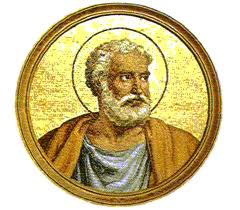 So what was the “Chair” of St Peter? Chosen by Christ as the “rock” on which to build the Church (cf. Mt 16:Â 18), he began his ministry in Jerusalem, after the Ascension of the Lord and Pentecost. The Church’s first “seat” was the Upper Room, and it is likely that a special place was reserved for Simon Peter in that room where Mary, Mother of Jesus, also prayed with the disciples. Therefore, we have the journey from Jerusalem, the newly born Church, to Antioch, the first centre of the Church formed from pagans and also still united with the Church that came from the Jews. Then Peter went to Rome, the centre of the Empire, the symbol of the “Orbis” – the “Urbs”, which expresses “Orbis”, the earth, where he ended his race at the service of the Gospel with martyrdom.
So what was the “Chair” of St Peter? Chosen by Christ as the “rock” on which to build the Church (cf. Mt 16:Â 18), he began his ministry in Jerusalem, after the Ascension of the Lord and Pentecost. The Church’s first “seat” was the Upper Room, and it is likely that a special place was reserved for Simon Peter in that room where Mary, Mother of Jesus, also prayed with the disciples. Therefore, we have the journey from Jerusalem, the newly born Church, to Antioch, the first centre of the Church formed from pagans and also still united with the Church that came from the Jews. Then Peter went to Rome, the centre of the Empire, the symbol of the “Orbis” – the “Urbs”, which expresses “Orbis”, the earth, where he ended his race at the service of the Gospel with martyrdom.
…This is testified by the most ancient Fathers of the Church, such as, for example, St Irenaeus, Bishop of Lyons, but who came from Asia Minor, who in his treatise Adversus Haereses, describes the Church of Rome as the “greatest and most ancient, known by all… founded and established in Rome by the two most glorious Apostles, Peter and Paul”; and he added:Â “The universal Church, that is, the faithful everywhere, must be in agreement with this Church because of her outstanding superiority” (III, 3, 2-3)….
Tertullian, a little later, said for his part:Â “How blessed is the Church of Rome, on which the Apostles poured forth all their doctrine along with their blood!” (De Praescriptione Hereticorum, 36).
Consequently, the Chair of the Bishop of Rome represents not only his service to the Roman community but also his mission as guide of the entire People of God.
Celebrating the “Chair” of Peter, therefore, as we are doing today, means attributing a strong spiritual significance to it and recognizing it as a privileged sign of the love of God, the eternal Good Shepherd, who wanted to gather his whole Church and lead her on the path of salvation.
Among the numerous testimonies of the Fathers, I would like to quote St Jerome’s. It is an extract from one of his letters, addressed to the Bishop of Rome. It is especially interesting precisely because it makes an explicit reference to the “Chair” of Peter, presenting it as a safe harbour of truth and peace.
This is what Jerome wrote:Â “I decided to consult the Chair of Peter, where that faith is found exalted by the lips of an Apostle; I now come to ask for nourishment for my soul there, where once I received the garment of Christ. I follow no leader save Christ, so I enter into communion with your beatitude, that is, with the Chair of Peter, for this I know is the rock upon which the Church is built” (cf. Le lettere I, 15, 1-2).
Dear brothers and sisters, in the apse of St Peter’s Basilica, as you know, is the monument to the Chair of the Apostle, a mature work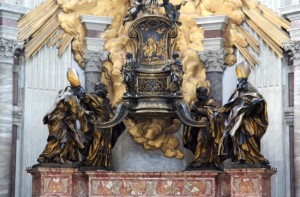 of Bernini. It is in the form of a great bronze throne supported by the statues of four Doctors of the Church: two from the West, St Augustine and St Ambrose, and two from the East:Â St John Chrysostom and St Athanasius.
of Bernini. It is in the form of a great bronze throne supported by the statues of four Doctors of the Church: two from the West, St Augustine and St Ambrose, and two from the East:Â St John Chrysostom and St Athanasius.
I invite you to pause before this evocative work which today can be admired, decorated with myriads of candles, and to say a special prayer for the ministry that God has entrusted to me. Raise your eyes to the alabaster glass window located directly above the Chair and call upon the Holy Spirit, so that with his enlightenment and power, he will always sustain my daily service to the entire Church. For this, as for your devoted attention, I thank you from my heart. –Vatican.va
Tags: bernini, catholic, catholic podcast, catholic prayer, cathollc spirituality, papacy, pope benedict xvi, st peter
This entry was posted on Tuesday, February 22nd, 2011 at 7:26 am
You can follow any responses to this entry through the RSS 2.0 feed.
The Seventh Monday in Ordinary Time – from the Gospel of Matthew the full reading and reflection
“Flesh and blood has not revealed this to you, but my Father who is in heaven”
an excerpt from today’s reflection by Don Schwager: 
At an opportune time Jesus tests his disciples with a crucial question: Who do men say that I am and who do you say that I am? He was widely recognized in Israel as a mighty man of God, even being compared with the greatest of the prophets, John the Baptist, Elijah, and Jeremiah. Peter, always quick to respond, exclaimed that he was the Christ, the Son of the living God. No mortal being could have revealed this to Peter; but only God. Jesus then confers on Peter authority to govern the church that Jesus would build, a church that no powers would overcome. Jesus plays on Peter’s name which is the same word for “rock” in both Aramaic and Greek. To call 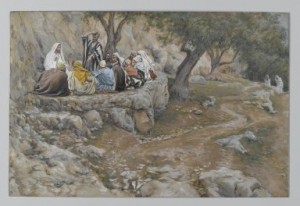 someone a “rock” is one of the greatest of compliments. The ancient rabbis had a saying that when God saw Abraham, he exclaimed: “I have discovered a rock to found the world upon”. Through Abraham God established a nation for himself. Through faith Peter grasped who Jesus truly was. He was the first apostle to recognize Jesus as the Anointed One (Messiah and Christ) and the only begotten Son of God. The New Testament describes the church as a spiritual house or temple with each member joined together as living stones (see 1 Peter 2:5). Faith in Jesus Christ makes us into rocks or spiritual stones. The Lord Jesus tests each of us personally with the same question: Who do you say that I am?
someone a “rock” is one of the greatest of compliments. The ancient rabbis had a saying that when God saw Abraham, he exclaimed: “I have discovered a rock to found the world upon”. Through Abraham God established a nation for himself. Through faith Peter grasped who Jesus truly was. He was the first apostle to recognize Jesus as the Anointed One (Messiah and Christ) and the only begotten Son of God. The New Testament describes the church as a spiritual house or temple with each member joined together as living stones (see 1 Peter 2:5). Faith in Jesus Christ makes us into rocks or spiritual stones. The Lord Jesus tests each of us personally with the same question: Who do you say that I am?
“Lord Jesus, I profess and believe that you are the Christ, the Son of the living God. You are my Lord and my Savior. Make my faith strong like Peter’s and give me boldness to speak of you to others that they may come to know you personally as Lord and Savior and grow in the knowledge of your love”.
for the full reflection visit : Daily Reading and Meditation
Tags: catholic, catholic podcast, catholic prayer, cathollc spirituality, don schwager, gospel of matthew
This entry was posted on Tuesday, February 22nd, 2011 at 5:38 am
You can follow any responses to this entry through the RSS 2.0 feed.
Episode 5 – Regnum Novum: Bringing forth the New Evangelization through Catholic Social Teaching with Omar Guiterrez – Value 4 Truth, Freedom, Justice, and Love part 2 “Justice”
– Value 4 Truth, Freedom, Justice, and Love part 2 “Justice”
Discerning Hearts is blessed to present Omar F. A. Guiterrez, M.A. , Special Assistant to Archbishop George Lucas of the Archdiocese of Omaha, in a groundbreaking series which breaks open the heart of Catholic Social Doctrine.
We encourage you to visit “Regnum Novum – A New Kingdom: A Revolution” Omar Guiterrez’s blog site
 We live at a very special time. The confluence of many things has brought forth the clear need to be able to articulate the Social Teaching of the Catholic Church in a way that is accessible and applicable. This is not to be an effort where high-minded theories are to be bandied about. Rather, this is a time of opportunity wherein we can apply the Social Doctrine to the concrete so as to bring about a New Kingdom, a Revolution. – Omar G. from Regnum Novum
We live at a very special time. The confluence of many things has brought forth the clear need to be able to articulate the Social Teaching of the Catholic Church in a way that is accessible and applicable. This is not to be an effort where high-minded theories are to be bandied about. Rather, this is a time of opportunity wherein we can apply the Social Doctrine to the concrete so as to bring about a New Kingdom, a Revolution. – Omar G. from Regnum Novum
[powerpress]
From episode … 5. Truth, Freedom, Justice, and Love part 2 “Justice”
These are the four values of the Social Teaching of the Catholic Church as they’re enumerated in the Compendium and as they were laid out by, again, Blessed Pope John XXIII in Mater et magistra and Pacem in terris. Without these values, the work of social justice becomes an albatross around our necks. It pulls us down, threatening to poison all the work we do, no matter how well intentioned.
Justice requires we know what is due to our neighbor. But even when justice is achieved, it can be cold and impersonal, as Pope John Paul II said. This is why the phrase “social justice†appears so rarely in the Church’s Social Teaching. Justice is the bare minimum, and we are not looking for the minimum.
(Truth, Freedom and Love are covered in other episodes)
Also visit Omar’s “Discerning Hearts” page Catholic Social Teaching 101
Tags: catholic, catholic podcast, catholic prayer, catholic social doctrine, cathollc spirituality, new evangelization, pope john paul ii, social justice, social teaching of the catholic church
This entry was posted on Monday, February 21st, 2011 at 11:04 am
You can follow any responses to this entry through the RSS 2.0 feed.
The Seventh Monday in Ordinary Time – from the Gospel of Mark the full reading and reflection
“All things are possible to him who believes”
an excerpt from today’s reflection by Don Schwager: 
When Jesus rebuked the evil spirit, the boy, at first, seemed to get worse rather than better as he went into a fit of convulsion. Peter Chrysologus, a 5th century church father, reflects on this incident: “Though it was the boy who fell on the ground, it was the devil in him who was in anguish. The possessed boy was merely convulsed, while the usurping spirit was being convicted by the awesome judge. The captive was detained, but the captor was punished. Through the wrenching of the human body, the punishment of the devil was made manifest.†God promises us freedom from oppression, especially the oppression of sin and evil that rob us of faith, joy, and peace with God. The Lord invites us, as he did this boy’s father, to pray with expectant faith. Do you trust in God’s unfailing love and mercy?
The mighty works and signs which Jesus did demonstrate that the kingdom of God is present in him. These signs attest that the Father has sent him as the promised Messiah. They invite belief in Jesus as the Son of God and Savior of the world. The coming of God’s kingdom means defeat of Satan’s kingdom. Jesus’ exorcisms anticipate his great victory over “the ruler of this world” (John 12:31). While Satan may act in the world out of hatred for God and his kingdom in Christ Jesus, and may cause grave injuries of a spiritual nature, and indirectly even of a physical nature, his power is nonetheless limited and permitted by divine providence (Romans 8:28). Jesus offers freedom from bondage to sin and Satan. There is no affliction he cannot deliver us from. Do you make full use of the protection and help he offers to those who seek him with faith and trust in his mercy?
“Lord Jesus, help my unbelief! Increase my faith and trust in your saving power. Give me confidence and perseverance, especially in prayer. And help me to bring your healing love and truth to those I meet”.
for the full reflection visit : Daily Reading and Meditation
Tags: belief in Jesus, catholic, catholic podcast, catholic prayer, cathollc spirituality, don schwager, exorcisms, gospel of mark, Lord Jesus, Peter Chrysologus
This entry was posted on Monday, February 21st, 2011 at 12:35 am
You can follow any responses to this entry through the RSS 2.0 feed.
Show 17 –Women Healed – Polycystic Ovarian Disease
Women Healed! An important turning point in the series, as Dr. Hilgers explores how a great many of the medical conditions experienced by women (and which effect men in an indirect way) can be understood and healed. Polycystic Ovarian Disease – what it is, how to properly treat it and the effect it can have on the overall health of women.
“Your Fertility Care Consultâ€
with Dr. Thomas Hilgers, founder of the Pope Paul VI Institute
for The Study of Human Reproduction
hosted by Kris McGregor
[powerpress]
Tags: catholic, catholic podcast, catholic prayer, cathollc spirituality, dr. thomas hilgers, fertility care, kris mcgregor, polycystic ovarian disease, pope paul vi institute, thomas hilgers
This entry was posted on Monday, February 21st, 2011 at 12:10 am
You can follow any responses to this entry through the RSS 2.0 feed.
The Seventh Sunday in Ordinary Time – from the Gospel of Matthew the full reading and reflection
“Be perfect, as your heavenly Father is perfect”
an excerpt from today’s reflection by Don Schwager: 
Jesus does something quite remarkable and unheard of. He transforms the law of mercy with grace and loving-kindness. Jesus also makes clear that there is no room for retaliation. We must not only avoid returning evil for evil, but we must seek the good of those who wish us ill. Do you accept insults, as Jesus did, with no resentment or malice? When you are compelled by others to do more than you think you deserve, do you insist on your rights, or do you respond with grace and cheerfulness?
What makes Christians different from others and what makes Christianity distinct from any other religion? It is grace – treating others, not as they deserve, but as God wishes them to be treated – with loving-kindness and mercy. God is good to the unjust as well as the just. His love embraces saint and sinner alike. God seeks our highest good and teaches us to seek the greatest good of others, even those who hate and abuse us. Our love for others, even those who are ungrateful and selfish towards us, must be marked by the same kindness and mercy which God has shown to us. It is easier to show kindness and mercy 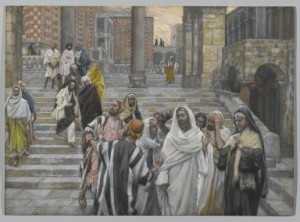 when we can expect to benefit from doing so. How much harder when we can expect nothing in return. Our prayer for those who do us ill both breaks the power of revenge and releases the power of love to do good in the face of evil. How can we possibly love those who cause us harm or ill-will? With God all things are possible. He gives power and grace to those who believe and accept the gift of the Holy Spirit. His love conquers all, even our hurts, fears, prejudices and griefs. Only the cross of Jesus Christ can free us from the tyranny of malice, hatred, revenge, and resentment and gives us the courage to return evil with good. Such love and grace has power to heal and to save from destruction. Do you know the power of Christ’s redeeming love and mercy?
when we can expect to benefit from doing so. How much harder when we can expect nothing in return. Our prayer for those who do us ill both breaks the power of revenge and releases the power of love to do good in the face of evil. How can we possibly love those who cause us harm or ill-will? With God all things are possible. He gives power and grace to those who believe and accept the gift of the Holy Spirit. His love conquers all, even our hurts, fears, prejudices and griefs. Only the cross of Jesus Christ can free us from the tyranny of malice, hatred, revenge, and resentment and gives us the courage to return evil with good. Such love and grace has power to heal and to save from destruction. Do you know the power of Christ’s redeeming love and mercy?
Was Jesus exaggerating when he said we must be perfect as our heavenly Father is perfect? The original meaning of “perfect†in Aramaic is “completeness†or “wholeness – not lacking in what is essential.†God gives us every good gift in Jesus Christ so that we may not lack anything we need to do his will and to live as his sons and daughters (2 Peter 1:3). He knows our weakness and sinfulness better than we do. And he assures us of his love, mercy, and grace to follow in his ways. Do you want to grow in your love for God and for your neighbor? Ask the Holy Spirit to change and transform you in the image of the Father that you may walk in the joy and freedom of the gospel.
“Lord Jesus, your love brings freedom and pardon. Fill me with your Holy Spirit and set my heart ablaze with your love that nothing may make me lose my temper, ruffle my peace, take away my joy, nor make me bitter towards anyone.â€
for the full reflection visit : Daily Reading and Meditation
Tags: catholic, catholic podcast, catholic prayer, cathollc spirituality, don schwager, gospel of matthew, seventh sunday in ordinary time
This entry was posted on Sunday, February 20th, 2011 at 9:21 am
You can follow any responses to this entry through the RSS 2.0 feed.
“Now They Call Me Infidel: Why I Renounced Jihad for America, Israel, and the War on Terror” by Nonie Darwish is one of the most compelling I have ever read. I have read many books about Islam and the Middle East, but not until Nonie Darwish was I able to put the truly human component to that study. And what I learned was truly eye-opening. Nonie discusses growing up in the Egypt and the Gaza, as well as Sharia Law, polygamy practices, envy and “the evil eye”, the treatment of women, and what we should watch out for in the future. Fantastic and courageous book (and life).
is one of the most compelling I have ever read. I have read many books about Islam and the Middle East, but not until Nonie Darwish was I able to put the truly human component to that study. And what I learned was truly eye-opening. Nonie discusses growing up in the Egypt and the Gaza, as well as Sharia Law, polygamy practices, envy and “the evil eye”, the treatment of women, and what we should watch out for in the future. Fantastic and courageous book (and life).
[powerpress]
Tags: catholic, catholic podcast, catholic prayer, cathollc spirituality, egypt, evil eye, islam, Israel, jihad, nonie darwish, Sharia Law
This entry was posted on Friday, February 18th, 2011 at 7:45 am
You can follow any responses to this entry through the RSS 2.0 feed.
The Sixth Friday in Ordinary Time – from the Gospel of Mark the full reading and reflection
“Whoever loses his life for my sake and the gospel’s will save it”
an excerpt from today’s reflection by Don Schwager: 
Jesus asks the question: What will a person give in exchange for his life? Everything we have is an out-right gift from God. We owe him everything, including our very lives. It’s possible to give God our money, but not ourselves, or to give him lip-service, but not our hearts. A true disciple gladly gives up all that he or she has in exchange for an unending life of joy and happiness with God. God gives without measure. The joy he offers no sadness or loss can diminish. The cross of Christ leads to victory and freedom from sin and death. What is the cross which Jesus Christ commands me to take up each day? When my will crosses with his will, then his will must be done. Are you ready to lose all for Jesus Christ in order to gain all with Jesus Christ?
“Lord Jesus Christ, I want to follow you as your disciple. I gladly offer all that I have to you. Take and use my life as a pleasing sacrifice of praise to your glory.”
for the full reflection visit : Daily Reading and Meditation
Tags: catholic, catholic podcast, catholic prayer, cathollc spirituality, don schwager, gospel of mark
This entry was posted on Friday, February 18th, 2011 at 7:41 am
You can follow any responses to this entry through the RSS 2.0 feed.
Episode 12-The Tenth Rule:
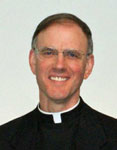 Let him who is in consolation think how he will be in the desolation which will come after, taking new strength for then.
Let him who is in consolation think how he will be in the desolation which will come after, taking new strength for then.
[powerpress]
 The Discernment of Spirits: Setting the Captives Free – Serves as an introduction to the Spiritual Exercises of St. Ignatius of Loyola
The Discernment of Spirits: Setting the Captives Free – Serves as an introduction to the Spiritual Exercises of St. Ignatius of Loyola
The 14 Rules for Discerning Spirits –
“The Different Movements Which Are Caused In The Soul”
as outlined by St. Ignatius of Loyola can be found here
Father Timothy M. Gallagher, O.M.V., was ordained in 1979 as a member of the Oblates of the Virgin Mary, a religious community dedicated to retreats and spiritual formation according to the Spiritual Exercises of St. Ignatius. Â Fr. Gallagher is featured on the EWTN series “Living the Discerning Life: Â The Spiritual Teachings of St. Ignatius of Loyola”.Â
For more information on how to obtain copies of Fr. Gallaghers’s various books and audio which are available for purchase, please visit  his  website: www.frtimothygallagher.org
 For the other episodes in this series visit
Fr. Timothy Gallagher’s “Discerning Hearts†page
Tags: catholic, catholic podcast, catholic prayer, cathollc spirituality, discernment of spirits, Father Timothy M. Gallagher, Timothy Gallagher
This entry was posted on Thursday, February 17th, 2011 at 8:05 am
You can follow any responses to this entry through the RSS 2.0 feed.
The Sixth Thursday in Ordinary Time – from the Gospel of Mark the full reading and reflection
“But who do you say that I am?”
an excerpt from today’s reflection by Don Schwager: 
Who is Jesus for you? At an opportune time Jesus tests his disciples with a crucial question: Who do men say that I am and who do you say that I am? He was widely recognized in Israel as a mighty man of God, even being compared with the greatest of the prophets, John the Baptist, Elijah, and Jeremiah. Peter, always quick to respond, professes that Jesus is truly the Christ. No mortal being could have revealed this to Peter; but only God.Through faith Peter grasped who Jesus truly was. He was the first apostle to recognize Jesus as the Anointed One (Messiah and Christ). Christ is the Greek word for the Hebrew word Messiah, which means Anointed One. Peter’s faith, however was sorely tested when Jesus explained that it was necessary for the Messiah to suffer and die in order that God’s work of redemption may be accomplished. How startled the disciples were when they heard these words! How different are God’s thoughts and ways from our thoughts and ways! Through humiliation, suffering, and death on the cross Jesus broke the powers of sin and death and won for us our salvation. The Lord Jesus tests each of us personally with the same question: Who do you say that I am?
“Lord Jesus, I profess and believe that you are the Christ, the Son of the living God. You are my Lord and my Savior. Make my faith strong and help me to live in the victory of the cross by rejecting sin and by accepting your will.”
for the full reflection visit : Daily Reading and Meditation
Tags: catholic, catholic podcast, catholic prayer, cathollc spirituality, don schwager, gospel of mark
This entry was posted on Thursday, February 17th, 2011 at 12:42 am
You can follow any responses to this entry through the RSS 2.0 feed.
“How to Get to “I Do” A Dating Guide for Catholic Women” by Amy Bonaccoro is the book Catholic single wo men are looking for (as well as their Catholic parents…I know, I am one of them). Filled with practical helps, as well as realistic understandings and approaches to navigating the cultural waters of today’s relationship scene, Amy does a great job. Be not afraid ladies…but do be discerning! More can found at her website. at http://amybonaccorso.com/
men are looking for (as well as their Catholic parents…I know, I am one of them). Filled with practical helps, as well as realistic understandings and approaches to navigating the cultural waters of today’s relationship scene, Amy does a great job. Be not afraid ladies…but do be discerning! More can found at her website. at http://amybonaccorso.com/
[powerpress]
Tags: catholic, catholic podcast, catholic prayer, cathollc spirituality
This entry was posted on Wednesday, February 16th, 2011 at 8:38 am
You can follow any responses to this entry through the RSS 2.0 feed.

